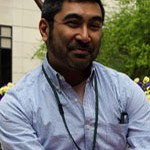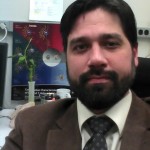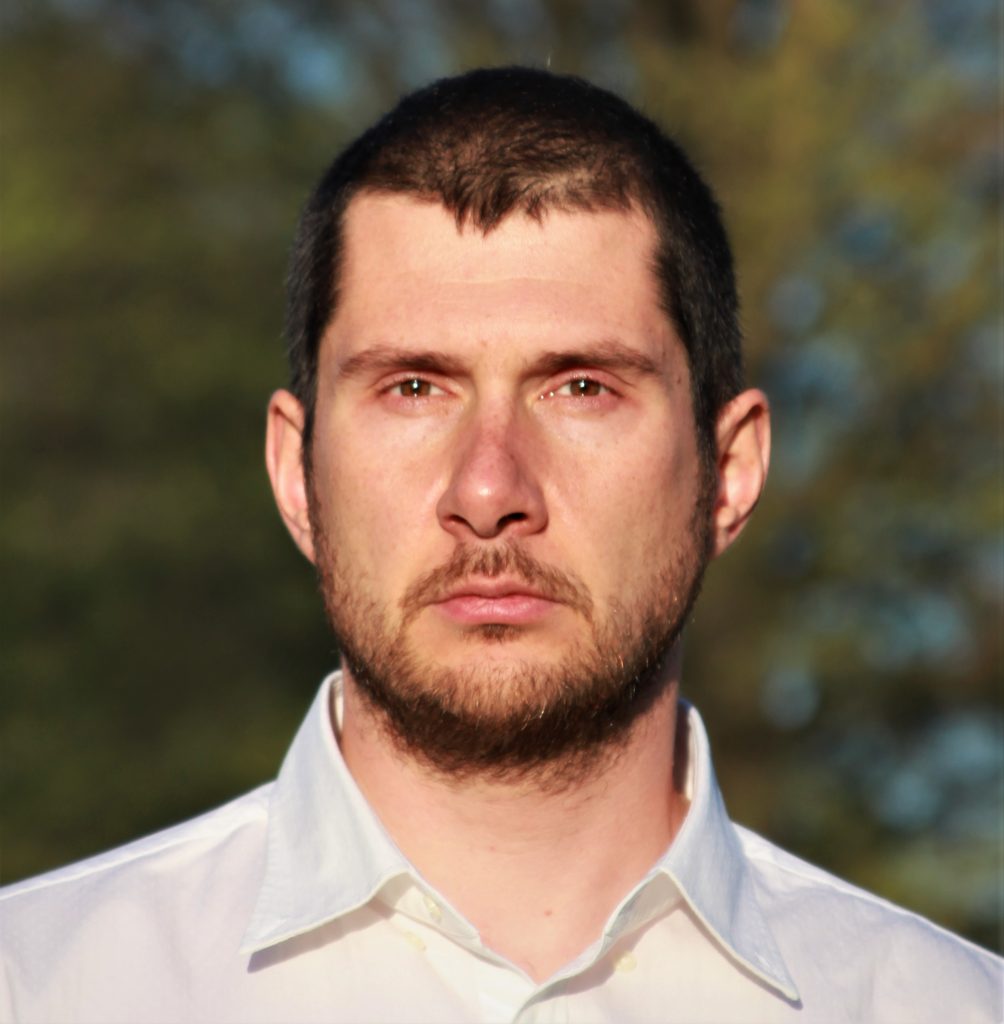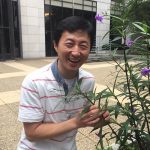Jobert Barin, PhD

Research Associate 2012-2016
Jobert received his Ph.D. degree in Immunology at Johns Hopkins University, School of Medicine, Department of pathology, where he continued as a Post Doctoral Fellow and quickly became Research Associate. His interest was in complex integration of cytokine networks in the development of myocarditis, heart disease and mucosal immunity.
Dr. Barin is currently employed at the FDA as a Senior Staff Fellow in the CDRH.
William Bracamonte-Baran, MD, PhD

Postdoctoral fellow 2015-June 2019
Dr. Bracamonte-Baran earned his MD degree (2004) and completed the Internal Medicine residency (2008) at the Central University of Venezuela. Then started a tenure as Assistant Professor in the same
University with appointments in the Department of Physiology and Internal Medicine, dedicating his clinical practice and basic research to diagnostic medicine, autoimmune diseases, biomathematics and cardiovascular physiology. In 2011 moved to Madison, Wisconsin, earning his PhD on Immunology (2015) at the University of Wisconsin, focusing on transplant immunology, making novel insights on the tolerogenic impact of allogeneic-derived exosomes, reprogramming of dendritic cells and exosome-dependent induction of energy mediated by PDL1/PD1 axis. Since October 2015 he is working in the Department of Pathology (Division of Immunology) at Johns Hopkins University (Dr. Daniela Čiháková’s lab) focusing on the study of heart-resident innate lymphoid cells and its role in autoimmunity and inflammatory heart diseases.
Dr. Bracamonte-Baran finished medical residency in Odessa, Texas, USA, in 2021. He was an internist in Midland, TX specializing in internal medicine (adult medicine) and currently he is a clinical fellow at Yale School of Medicine.
Guobao (Paul) Chen, PhD

Postdoctoral fellow 2015-2018
Guobao earned his B.S. in Life sciences (Molecular Cell Biology concentration) from National University of Singapore, Singapore. He continued to pursue a Ph.D. from National University of Singapore Immunology Program in the laboratory of Professor Jinhua Lu on the gene transcription control of C1q, the recognition component of the complement system. His work led to the discovery of the molecular mechanism behind the synchronized expression of the three subunit genes of C1q through a central regulatory cis-element. In Cihakova lab, Guobao is currently investigating the role of cardiac fibroblasts in post-cardiac injury inflammation and remodeling process through two cardiac injury mouse model: the experimental autoimmune myocarditis mouse model and myocardial infarction mouse model.
Dr. Chen is currently Senior Scientist I, autoimmunity at AbbVie Pharmaceuticals, Greater Boston Area.
Alexis Choi

September 2021-June 2022
Alexis Choi is a current undergraduate student at Johns Hopkins University with a major in Public Health Studies and a minor in Spanish for the Professions. Her work in the Čiháková lab was focused on the tissue-resident memory cells and its role in subsequent inflammation and autoimmune diseases, such as myocarditis.
Alexis is currently perusing her undergraduate degree and hopes to continue research in the future.
HeeSun Choi, PhD

Received her PhD January 2020
Hee Sun was born and grew up in Seoul, South Korea. She earned her B.S. and M.S. in Biotechnology from Yonsei University in South Korea. To pursue a Ph.D, she joined the Pathobiology Graduate Program at Johns Hopkins University School of Medicine. In the Cihakova lab, she worked on elucidating the role of innate lymphoid cells in the development of pericarditis and the role of immune cells and cardiac resident cells in the pathogenesis of pericarditis. HeeSun received her Ph.D. in August 201, and stayed on as a postdoctoral fellow until November 2019.
Currently HeeSun is a post doctoral fellow in the lab of Dr. Kuchroo at Brigham Women’s Hospital and Harvard Medical School in Boston.
Abdel Rahman Daoud, B.S., M.S.

Programming Analyst
Abdel Rahman Daoud graduated with a B.S. in biomedical engineering and biochemistry with minors in computer science and biology core curriculum from the University of Wisconsin-Madison. During his undergraduate study, he worked on several short-term projects that spanned foci, such as molecular neuroscience, biomaterial design and virology. For the past year and a half, he had been working on a physiology project with the UW-Madison Biology Core Curriculum Department that focused on the optimization of husbandry conditions for the maintenance of California Blackworms, an annelids species utilized conventionally as a vascular biology tool by high school teachers and college professors. Currently, Abdel is a Master of Health Science student in the Molecular Microbiology and Immunology Department of the Bloomberg School of Public Health. Abdel’s primary role in the Čiháková Lab includes contribution to efforts that aim to analyze data collected from sequencing cardiomyocyte nuclei isolated from mice and human heart tissues. Abdel received his master’s degree in May 2023 and continues to work on the CODA project in the Cihakova lab. As of May 2025, Abdel has moved on to a MD/PHD program at SUNY Upstate Medical University.
Paul Delgado

Received her MS June 2021
Paul received her B.S. in Biology from the University of Oklahoma in May 2018. She then completed her Master of Science in Molecular Microbiology and Immunology from the Johns Hopkins Bloomberg School of Public Health in May 2020. During her time at JHSPH, she also earned a certificate in Tropical Medicine and a certificate in Health Disparities and Health Inequalities. In the Čiháková lab, she studied the protective role of pericardial macrophages and their efferocytosis potential during experimental CVB3 myocarditis.
Paul is currently pursuing her DO degree at Oklahoma State University College of Osteopathic Medicine.
Nicola Diny, MS

Received her Ph.D. May 2017
Nicola received her Bachelor’s degree in Biomedicine and Biotechnology from the University of Veterinary Medicine Vienna, Austria in 2008. She then completed the master’s program in Molecular Medicine at the Charité Berlin in Germany. In Dr. Antje Voigt’s laboratory at the Charité, Nicola studied the protective role of the interferon-stimulated gene 15 (ISG15) in Coxsackie virus B3-induced myocarditis. Since 2011, Nicola has been pursuing her PhD in the Department of Molecular Microbiology and Immunology. She studies the role of eosinophils in autoimmune myocarditis and in the progression to dilated cardiomyopathy, as well as the pathways that are involved in eosinophil trafficking to the heart.
Dr. Diny did a Post Doctoral Fellow at The Francis Crick Institute, London, England. Currently Dr. Diny is a Junior Research Group Leader at University of Bonn, Germany.
David Elias, BS

David Elias received his B.S. in Molecular Biophysics and Biochemistry from Yale University in 2016. Throughout his undergraduate training, he worked in the lab of Dr. George Miller and Dr. Ayman El-Guindy, investigating the role of a long noncoding RNA, BHLF1, in Epstein Barr Virus lytic replication. Following graduation, he completed a 2-year post baccalaureate program at the NIH in the lab of Dr. Edward Berger where he worked on the development of CAR T cells as a potential HIV therapeutic. In 2018, he began his time at Johns Hopkins as a matriculant into the M.D.-Ph.D. program and is a student in the Graduate Program of Immunology. As a member of the Cihakova lab, David is studying how the stroma of the heart coordinates the immune response to injury and infection. Additionally, he is interested in therapeutically targeting cardiac fibroblasts to slow down the development of heart failure.
David is now continuing with Medical School.
Xuezhou (Snow) Hou, BS

Received her PhD January 2019
Xuezhou (Snow) Hou grew up in Shanghai, China before earning her B.S. in Biology at the Rochester Institute of Technology. She then spent a year working on a Bill & Melinda Gates foundation project at QIAGEN, developing multiplex isothermal helicase-dependent DNA amplification assays for point-of-care STI detection in resource limited areas. She later joined Dr. David Fredricks’ group at the Fred Hutchinson Cancer Research Center, studying the roles of bacterial vaginosis associated bacteria in the development of pelvic inflammatory diseases. As an O’Leary Wilson predoctoral fellow PhD student in the Čiháková laboratory, Snow is currently studying the roles of monocytes and macrophages in the development of dilated cardiomyopathy (DCMi), a sequelae of myocarditis that often results in debilitating outcomes in human patients.
Dr. Hou is currently Senior Scientist at Bristol Myers Squibb.
David Matthew Hughes, PhD

Received his PhD May 2023
David Hughes graduated with a B.S. in Chemical Engineering from Virginia Tech in 2017. During the early years of his undergraduate he performed work on the plasma processing of fluids in the lab of Dr. Muhammad Malik at Old Dominion University in between academic terms. Afterwards he studied the mechanical properties of polymer blends, and how blending affects polymer strength in the lab of Dr. Jack Lesko at Virginia Tech. David earned his PhD in Chemical and Biomolecular Engineering from Johns Hopkins University in the Cihakova lab studying the role of GATA6+ pericardial macrophages during cardiac inflammation in 2023. He currently (2023) works as an Engineer for the Naval Undersea Warfare Center.
Wonyoung Jo, BS

Wonyoung Jo graduated with a B.S. with Honors in Bioengineering from Washington State University in 2022. During his undergraduate studies, he worked in the lab of Dr. Wenji Dong, investigating a paper-based nucleic-acid amplification (NAA) test for rapid diagnosis of COVID-19 infection by modeling cascading CRISPR reactions with artificial Y-shaped DNA. Currently, Wonyoung is a Master of Science student in the Biomedical Engineering Department of the Whiting School of Engineering and the School of Medicine. In the first year of his Master’s degree, he conducted research on SHAPR (SSB-Helicase Assisted Rapid PCR), a novel isothermal amplification method, in the lab of Dr. Taekjip Ha. His primary role in the lab was to standardize experimental conditions and design experiments to understand the mechanism of SHARP. He joined Dr. Čiháková’s lab in May 2023. His work in the Čiháková laboratory focuses on knocking out specific immune checkpoint inhibitors on T cells using CRISPR to study the effects of treatments on autoimmune diseases such as myocarditis in mouse models.
Hannah Maryam Kalinoski, BS, BA

Received her PhD December 2023
Hannah Kalinoski graduated with a B.S. in microbiology and a B.A. in sociology from the University of Washington. During her undergraduate program she was fortunate to work in the lab of Dr. Deborah Fuller where her project focused on optimizing a novel influenza vaccine. Following the completion of her degree, she worked as a research scientist in the lab of Dr. Michael Jensen in the Ben Towne Center for Childhood Cancer Research (BTCCCR) at Seattle Children’s Hospital. During her time at BTCCCR, her work focused on evaluating novel therapies and performing the preclinical data analysis for IND submissions to the FDA. Hannah is a student in the Molecular Microbiology and Immunology Department in the Bloomberg School of Public Health. Currently, her work in the Čiháková lab is focused on treating viral myocarditis and preventing its progression to dilated cardiomyopathy. Hannah is perusing a post doctoral fellowship at the Children’s Hospital in Seattle, Washington.
Diego Lema, MD, PhD

Postdoctoral Fellowship June 2021- June 2023
Diego Lema received his M.D. from the Central University of Venezuela in 2015. While earning his M.D, he also performed research at the university’s Institute of Immunology under Dr. De Sanctis’ and Dr. Garcia’s mentorship, concentrating on asthma and COPD. He then earned his Ph.D. in Immunology from the University of Wisconsin-Madison in 2021 working in the lab of Dr. Burlingham. In 2021 Dr. Lema joined the Cihakova lab as a postdoctoral fellow, where he researched immune therapeutics targeting inflammatory cytokines in myocarditis.
Diego is currently (2023) an internal medicine resident at Jefferson Health/ Einstein in Philadelphia.
Shagun Lukkad

Graduate Student
Hailing from India, I earned my Bachelors degree in Biotechnology at Fergusson College, and am now immersed in the pursuit of a Masters degree in the same field. Throughout my academic journey, I have consistently gravitated towards the fascinating field of Immunology, driven by its profound foundation in combating autoimmune diseases and cancer through therapeutic interventions. I aspire to pursue a PhD in Immunology in the future. As of May 2025, Shagun accepted a Research Technologist position at Yale University.
Neil Mahto

Neil is an undergraduate student majoring in computational neuroscience. He was first exposed to scientific research under the guise of Dr. Sam McKenzie at the University of New Mexico where he conducted research on neuronal transitions between sleep states and epilepsy treatment. Neil has also published two papers in the field of neurosurgery. In the Cihakova lab, Neil is using CODA to perform 3d reconstructions of heart tissue.
Daniela Bresciani Padilla

Received her BA May 2020
Daniela Bresciani Padilla obtained her B.A. in Public Health Studies degree from Johns Hopkins University, May 2020. She also obtained a concentration in Molecular Microbiology and Immunology. Daniela joined the Čiháková Lab in 2018 and she has been studying self-antigens present in different salivary gland cell populations and their role in the development of Sjӧgren’s Syndrome.
Daniela is currently pursuing an MD degree at the University of Puerto Rico Medical School.
Siddharth Patel, BS, MS

Siddharth Patel graduated from the University of Delaware in 2023 where he earned a B.S. in Physics with a concentration in Astronomy/Astrophysics and a minor in Mathematics. The following year, 2024, he also earned a M.S. in Data Science. During his undergraduate studies, he participated in multiple data-driven research projects across different domains, such as sonification of supernovae light, and measuring residential/commercial light usage through Manhattan skyline imagery. After the completion of his Physics degree, Sid spent the summer at NASA Goddard Space Flight Center as a Computer Vision intern. At NASA he designed an image processing pipeline and prototyped an automatic image classification model to accelerate phytoplankton research. In February of 2025, he joined the Dr. Cihakova lab to contribute to their on-going research involving computer vision and image analysis.
Vitali Rusinkevich MS, MD, PhD

Postdoctoral fellow February 2020-June 2022
Dr. Rusinkevich received his MD degree (2005) from the Belarusian State Medical University and completed the internship at the Minsk Regional Clinical Hospital (2006) being specialized in Intensive Care & Anesthesiology. In 2011 Dr. Rusinkevich obtained Master’s Degree in Surgery from the School of Medicine of Shanghai Jiao Tong University with a major specialization in Cardiac Surgery Intensive Care. After several years of work as a cardiac surgery ICU physician, Dr. Rusinkevich have decided to devote himself to a scientific path and started his Ph.D. program in the laboratory of Molecular Cardiology of professor Yang Huang-Tian at The Shanghai Institutes for Biological Sciences. In 2018 Dr. Rusinkevich obtained his Ph.D. degree in Cell Biology. In his research, he focused on cardiology and immunology. During his Ph.D. degree, he studied the immune response in myocardial infarction. After graduation, Dr. Rusinkevich has served as a Postdoctoral Fellow at Dr. Kay Wagner lab in The Institute of Biology Valrose, INSERM (Nice, France), where he studied the role of transcription factor WT-1 on cardiac angiogenesis and inflammation following myocardial infarction. Dr. Rusinkevich joined the Cihakova lab from February of 2020 starting several projects related to immune aspects of myocardial infarction and aortic aneurism.
Currently Vitali is a trainee at CHOP (Children’s Hospital of Philadelphia).
Srithan Ram Thammineni

Ram is undergraduate student at Johns Hopkins University majoring in Neuroscience with specific focus in computational neuroscience. He has had experience in multiple spheres of computational medicine including creating a convolutional neural network that diagnoses Multiple Sclerosis with high accuracy and working with the Department of Veterans Affairs to develop and write a research paper about the Clinical Trials Selector. Ram also has a passion for public health which led him to working under the wing of the Director of the National Artificial Intelligence Dr. Gil Alterovitz on a joint venture between Harvard Med School and a confidential international conglomerate to establish labs and hospitals in India. At Čiháková Lab Ram is developing a machine learning model to diagnose myocarditis via analysis of noninvasive imagine modalities such as MRI, CT, and PET scans. In his free time, Ram loves to play basketball, cook, and travel around the world.
Taejoon Won, PhD

Postdoctoral Fellowship June 2017- July 2023
Taejoon earned his M.S. and Ph.D. in Immunology from Chung-Ang University, Seoul, South Korea in 2005 and 2010, respectively. Through his graduate studies, he focused on developing novel prevention and treatment strategies for various immune-mediated diseases such as atopic dermatitis, osteoporosis, Alzheimer’s disease, type 1 diabetes, asthma, and cancer. Taejoon served as a Postdoctoral Fellow in Dr. Yasmina Laouar’s lab at the University of Michigan, where he studied the role of TGF-β on the mucosal innate immune system including innate lymphoid cells, dendritic cells, and macrophages. Taejoon joined the Cihakova lab as a Postdoctoral Fellow in July 2017 and researched the role of the PD-1/PD-L1 pathway in myocarditis, the pathogenesis of immunothrombosis in COVID-19, and the mechanisms underlying COVID-19 mRNA-related myocarditis.
Taejoon is currently (2023) an Assistant Professor in the College of Veterinary Medicine at the University of Illinois Urbana-Champaign, where he continues to contribute his expertise to the field of cardiac immunology.
Megan Kay Wood, BS

Received her PhD June 2022
Megan Wood received her B.S. in biochemistry from the University of Arkansas. Her honors thesis focused on synthesizing short 11-15mer peptides, rich in arginine and tryptophan and looking at their antimicrobial activity against bacteria. Following her degree, she worked as a research technician in Wayne Yokoyama’s immunology and pathology laboratory at Washington University School of Medicine in St. Louis. From 2015-2017 she joined the United States Peace Corps and moved to Ghana, West Africa where she worked intimately with nurses and mothers in combating malnourishment and malaria prevention in children under 5. Megan was a student in the department of Molecular Microbiology and Immunology, where she joined the Cihakova lab. She studied the role of viral infections in the development of myocarditis and complications in the heart after viral clearance. Megan Wood recently graduated from the Molecular Microbiology and Immunology program at the school of public health system.
Megan is currently a Senior Scientist at AbbVie Pharmaceuticals, Greater Boston Area.
Xinyi Zhong

Graduate Student
Xinyi Zhong was graduated from Xi ‘an Jiaotong University in 2023. Xinyi now is a graduate student at Johns Hopkins University majoring in Medical Imaging Processing with specific focus in deep learning techniques. During her undergraduate studies, she has done many projects on image processing, including the optimization of forest de-fogging systems, the identification and classification of spinal joint lesions and brain tumor lesions. Currently, in the Čiháková Lab, she is focused on the role of applying deep learning AI technology to ANCA research, such as feature extraction, segmentation and classification of images through different staining patterns, and detection of disease conditions. As of May 2025 Xinyi will return to China to finish her master’s degree.
